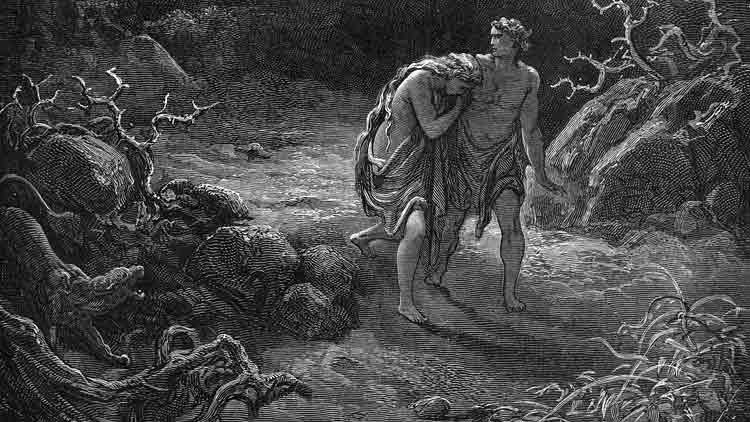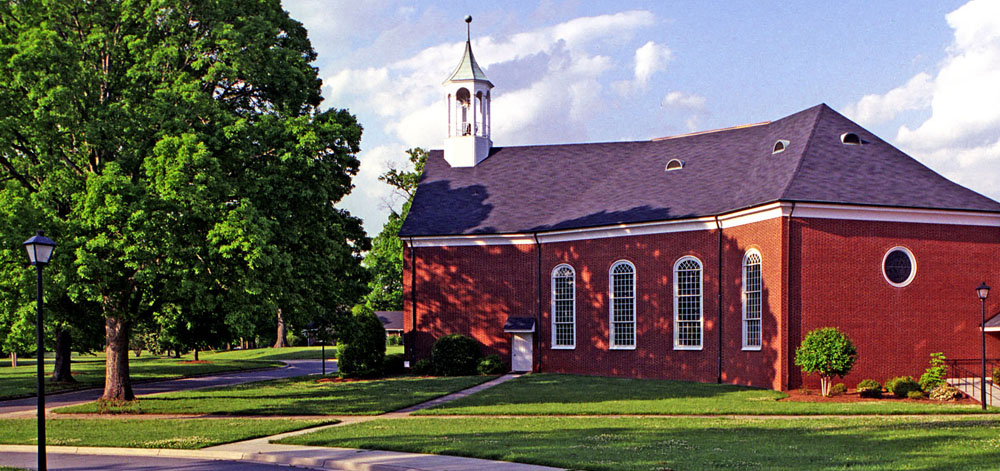Ephesians 2:11-22
It was the great psychologists Karl Jung who said that “most people are hopelessly unconscious of evil.” The authors of the Bible are not “most people.” Over and over again the Bible warns us against evil in many forms.
The Bible warns against the evil of human sin. We sin when we break God’s law. God laid down the law to protect us from ourselves, and from one another. Therefore, sin is anything that we do, or fail to do, by which we hurt ourselves or one another. Sin is also missing the mark. God wants great things for us, and from us. We sin when we fail to achieve all that we might.
The Bible warns against the evil of Satan, also known as the devil. Some people laugh at the idea of the devil, but serious theologians never have. Luther said, “his craft and power are great, and armed with cruel hate, on earth is not his equal.” In 1st John 3:8 the apostle writes that the reason that the Son of God appeared was “to destroy the works of the devil.” Emil Brunner said that to believe in the devil is to believe that the possibilities of evil are not exhausted by purely human evil. By this definition, I certainly believe in the devil. Just when I think we have reached the height, and depth, and width, and breadth of human evil, some new evil appears to partially eclipse all former records. The supply of evil in our world seems inexhaustible.
The Bible warns against, idols and demons and what the 6th chapter of Ephesians calls, “the principalities and powers, the world rulers of this present darkness, the spiritual hosts of wickedness in the heavenly places.” On the one hand, the Bible speaks of these powers as the invisible powers of the air, meaning that they are “out there,” between heaven and earth, just beyond our ability to see them. We know evil like we know the moon. We see one side of the moon and often just a sliver of that, but there a dark-side we cannot see at all. So it is with evil, and that evil which we do not see is more heinous, more terrible than that we can see. On the one hand the Bible speaks of these mysterious powers of the air. On the other hand, the Bible identifies these invisible powers with the visible powers of this world, “the world rulers of this present darkness.” It speaks of Herod, and Pontius Pilate, and Caesar, and Rome, and of the Priests and the temple system that opposed Jesus. William Stringfellow describes the powers as:
All institutions all ideologies, all images, all movements, all causes, all corporations, all bureaucracies, all traditions, all methods and routines, all conglomerates, all races, all nations, all idols.
In Colossians 1, we read that the principalities and powers are created in Christ. That means that the powers have the potential for great good. There is a fine example in Romans 13. Therein we read the rulers who bear the sword in this world, are not a terror to good conduct, but to bad. Let’s apply that to the present day.
Here in Winston-Salem, North Carolina, our city government appoints the members of our police force “to protect and serve” all of us. Some of our members here at New Philadelphia are members of the police force, and some of us pray for them daily, and all of us ought to. The wanton killing of police officers in Dallas reminds us just how dangerous their job really is. It takes a special person to be a police officer, and we do not have an endless supply of people who are up to that task. Let me illustrate just how special a law enforcement officer has to be. I discovered it more than two decades ago when one of our members, Lonnie Ashby invited me to ride patrol with him in his car.
Early on the night in question we responded to a call of “shots fired.” When we arrived on the scene a number of young men were standing on a street corner. One of them had his hand in his jacket. Lonnie turned to me and said, “Stay here.” I said, “You betcha!” Lonnie then got out of the car and walked up to the group of men. His hand was on his gun. He said, “Young man, please remove your hand from your jacket.” For several long seconds the man refused to do so. Thankfully, as the tension heightened, his girl friend ran to him and pulled his arm outside his jacket saying, “Show that man you don’t have a gun!” He did, and everyone was relieved. Not responding in fear to that man, took courage on Lonnie’s part. It takes courage to be a police officer; but courage is one of many qualifications.
A few hours later, I discovered what else it takes. We were called to a convenience store by the owner who reported a young man raising a ruckus. When we go there a young man was coming out of the front door. He wore no shirt, and his pants were half way to his knees. He was showing eight inches of very colorful boxer shorts. I wanted to say, “Young man, please pull up your shorts!” Luckily, I kept quiet and watched, and listened, as Lonnie spoke to him. He spoke as he might have spoken to the mayor himself. Lonnie soon determined that this young man was not the troublemaker, and I am sure that the young man left knowing that at least one police officer was his friend.
When I think of police officers I think of people like Lonnie Ashby, and Mike Saunders, and Mike Flemming, and Ron Reeves, and Kelsey Grainger Of course, the truth is that not all police officers are like Lonnie and the other officers we know.
I cannot imagine living in a country with police like the Nazi SS or the Soviet Union’s SS, but we live in a fallen world, and all the powers must exercise a constant vigilance to avoid falling becoming mired in the depths of sin. Power corrupts, and great power corrupts greatly. Police have great power. One good officer, like Lonnie Ashby can prejudice us toward the police, yet because they all stand in the long blue line, and wear the uniform, one bad officer can prejudice someone else against them.
I suppose this is a good time to point out that race, too, is a power. Now race in a good thing, and God loves all races equally. Perhaps you remember the old Bible School song which goes:
“Jesus loves the little children,
All the children of the world.
Red, and yellow, black, and white,
They are precious in his sight,
Jesus loves the little children of the world”
Racial difference were a part of God’s plan. Scientists say that the various colors, and hues, and shades of our hair, and skin, and eyes, suit us for living in the various climates of the world in which we live. Yet, race can also be bad. Almost invariably, when the races started moving about the globe—and some were forcibly moved about the globe, race caused problems. Race makes it easy for people to separate themselves from other people. Many people have one or more good experiences with a people of a different race, and they assume that all people of that race or like the people they know. Or, and this is the tragedy, people have one or more bad experiences with a people of a different race, and they assume that all the people of that race are like those people. Of course, if race is not the defining difference, something else may be.
I am told that, in some countries of the far north, people look down upon others not because of the color of their skin, for they are all pale, but because of the color of their eyes.
And you may recall how Dr Seuss once told the tory of how the star bellied Sneetches discriminated against the plain bellied Sneetches. The discrimination continued until an entrepreneur named Sylvester McMonkey McBean appeared and offered those without stars the chance to get them for three dollars, just by passing through his Star-On Machine. The treatment was instantly popular, and lots of plain bellied Sneetches got stars. This meant that the original star bellied Sneetches lost their special status. So McBean told them about his Star-Off Machine. And the Sneetches who originally had stars happily payed ten dollars to have them removed. It always cost more to have a star removed, than to have a star added. But cost was no deterrent to the Sneetches, and soon the recently starred Sneetches start paying to have their stars removed as well. If you know the story, you know that this back and forth just escalated the conflict, until Sneetches of both kinds ended up running from one machine to the next until all of Sneetch society broke down in confusion. It was at that point that Sylvester McMonkey McBean departed a rich man. As he exited the city of the Sneetches McBean said, “You can’t teach a Sneetch.” Yet, eventually the Sneetches did learn. They learned how little difference a star makes, and when they did, they all became friends.
That is a story book ending if every I heard one. I wish we could predict a similar ending for the people of Dallas, and Louisiana, and Baltimore, and Minnesota, and Missouri, and Winston-Salem, North Carolina. Unless we learn what the Sneetches learned, all of us, those of us with stars, and without, red and yellow, black and white, and brown, will continue to live in fear of each other. And we will waste our money, and money we ought to be setting aside for our children trying to protect ourselves from one another. And the only one who will profit is the one that the Bible calls: that ancient Serpent, the Father of lies, the God of this present age, the prince of the powers of the air. What ever we call it, it has successfully convinced a great many of us, perhaps a majority of us, that it is possible to judge a person’s character by something as insignificant as the color of that person’s skin. How much better if would be for us all if only we learned to dream the dream of Dr. Martin Luther King, Jr. It was Dr. King who said:
“I have a dream that someday…the sons of former slaves and the sons of former slave owners will sit down in peace, on the red clay hills of Georgia…and I have a dream that my four little children will one day live in a nation where they will not be judged by the color of their skin but by the content of their character.”
The Bible teaches that we can live that dream only if we overcome the evil, and we can over come the evil only by facing up to it. This is what Numbers 21 is trying to teach us. In Numbers 21, when the people of Israel sinned against the LORD by murmuring against the LORD, and against Moses. The LORD sent fiery serpents among the people, and the serpents bit the people, and many of those who were bitten died. And when the people tired of dodging the serpents, the people came to Moses and said, “We have sinned, for we have spoken against the LORD and against you; pray to the LORD, that he take away the serpents from us.” So Moses prayed for the people. And the LORD said to Moses, “Make a fiery serpent, and set it on a pole; and every one who is bitten, when he sees it, shall live.” And Moses made a serpent of bronze, and set it on a pole; and if a real serpent bit any man, he would look at the bronze serpent and live.
The man who looked upon the bronze serpent did not live because God took the serpents away. God did not. The serpents were still there. The man who looked upon the bronze serpent lived because he obeyed God and looked on the bronze serpent, and when he looked at the bronze serpent, he remembered the fiery serpent which had bitten him, and he remembered the sin he had committed so that God sent the fiery serpents, and he remembered his part of the sin, and no doubt he regretted it, and he repented of it, and he was healed.
We will never heal the racial divide in the United States of America until we face the evil of it, and remember our own part of it. Excuse me, if you will, as I remember a few episodes out of my own life, good and ill.
I remember the innocence of living with my grandmother on Cotton Street. I remember playing with a boy, my age, who had dark skin, and hair that was more than curly. At the tag end of a long summer, I asked, “How did you get so dark?”“The sun, I guess,” he said. And we thought no more of it. There is a lesson there. We can’t ignore race—that is impossible; but neither can we judge one another because of it. I think we are born without prejudice, unfortunately, we learn prejudice from our environment. After I preached this sermon, on of our members, sent me the words of a song sung by two children in the musical, “South Pacific.”
You’ve got to be taught
To hate and fear, you’ve got to be taught from year to year
It’s got to be drummed in your dear little ear
You’ve got to be carefully taught.
You’ve got to be taught
To be afraid of people
Whose eyes are oddly made
And people whose skin is a different shade
You’ve got to be carefully taught.
I remember two drinking fountains at the bottom of the Four and 1/2 Street stairs in Sears & Roebuck, one was marked White, and the other was marked Colored. One day when I was six of seven year old, this would have been about 1956, I took a drink from the fountain marked, “Colored.” My grandmother came up behind me, and said, “Don’t do that, honey, it shows a lack of respect.” My grandmother meant well; and, to be candid, I am not sure I did. Yet, today, I am sure that the idea of separate but equal is an idea that no one can truly respect. There is no such thing as separation among true equals.
I grew up in a household that was as free of prejudice as my parents could make it. My dad has served with black troops during the 2nd World War, and he loved them, and they him. My mom and dad were both Christians. Yet, my neighborhood was far from free from prejudice. Once, when I was about twelve years old, mimicking the boys in my neighborhood, I spoke of black people, as a group, using a word that now has no appeal to me now, at all. My father, who, unknown to me, was standing right behind me, was so instantly and completely ashamed of me that he slapped me up along the side of my head. It was just a cuff. He did not hit me hard, but he got my attention, for it was the only time I ever remember my father striking me with anything other than his belt, and he always confined my whippings to below the knee.
The summer before I started college I went to work for Shutt Hartman Construction Company laying sanitary sewage. I was the only white boy in a crew of black men. I remember those men coming to accept me and teach me the ropes. I remember that one young man, not much older than me, who would never go to college, old me how glad he was that I was going. I remember being humbled by that. And I remember the day that our foreman forgot the Dixie cups, and we only had one small Coke bottle between us, and we stood in a circle around the cooler, and we filled that bottle over and over again, and we passed it to one another, and we drank from that bottle like it was the Common Cup, and it was, for me at least, sacramental. I wish I had taken of that sacrament more regularly. I needed it. Later that same summer, I was sitting on a loading dock, listening to another college boy with a summer job telling a joke at the expense of the black man who was our supervisor. Before I could catch myself, I laughed. When I did that man looked not at the boy who told the joke, but at me. Later, we patched things up, but our relationship was never the same again. Bonhoeffer was right, sometimes, not to act is to act; and not to speak, is to speak.
Just one more story. In 2001 I went to Jamaica on a friendship mission with our youth. One Saturday night, along with one of the boys on the trip, I went with a Jamaican pastor to downtown Mandeville. There were hundreds of people on the street, maybe thousands, and we were the only white faces visible. I saw no one I knew, and no one would greet us, or even allow their eyes to linger long upon us. It was if we were invisible. I remember thinking of the Ralph Ellison book, “The Invisible Man;” and I remember wishing that somebody would just see me, and that, in seeing me, they might look beyond the color of my skin, and know that I was a Christian, and that I was not all that much different from them, and that I had good will toward them.
Let me say it once more: If we are going to beat the evil, we face up to the evil, but we must also see beyond the evil, and look to the God who wants us to conquer it. Jesus said: “As Moses lifted up the serpent in the wilderness, so must the Son of man be lifted up, that all who believe in him might have eternal life.” In John’s Gospel, eternal life is not just the endless length of days we achieve in eternity; but a quality of life we enter into right now. God wants us to live in a better world. In Ephesians 2, the apostle says that it is the same Jesus who offers us Eternal Life who has broken down the “dividing wall of hostility” that once separated people of different races, Jews and gentiles, creating in his body one new person in the place of two. Jesus is able to bring all the races together in his body, the church, and we must be a model for the world; but, first, we must face the evil in ourselves.
Finis











